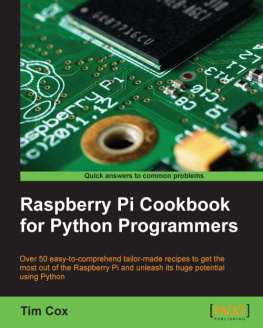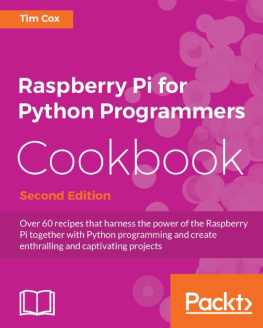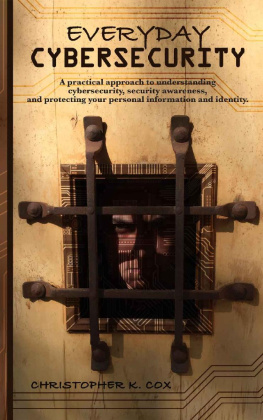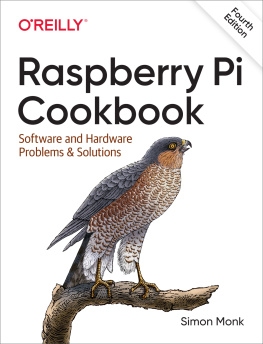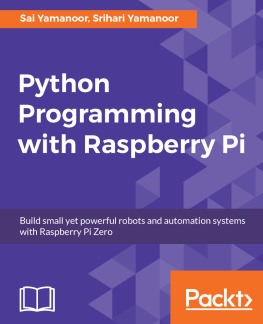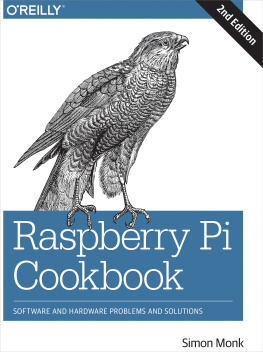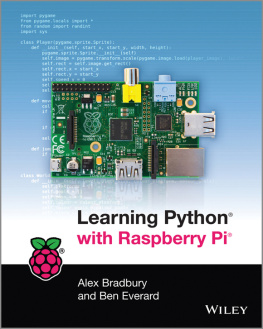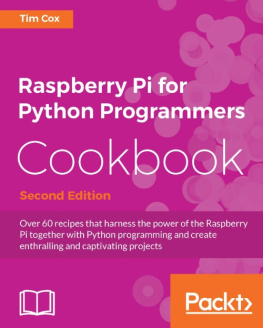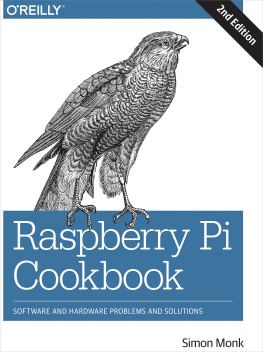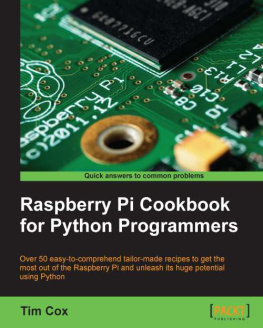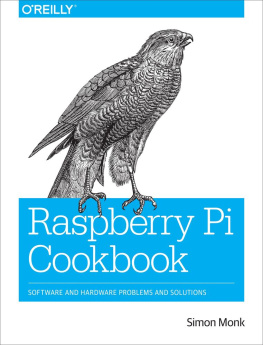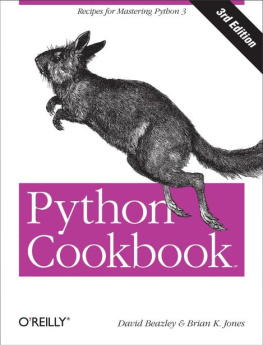Cox - Raspberry Pi Cookbook for Python Programmers
Here you can read online Cox - Raspberry Pi Cookbook for Python Programmers full text of the book (entire story) in english for free. Download pdf and epub, get meaning, cover and reviews about this ebook. City: Birmingham;England, year: 2014, publisher: Packt Publishing, genre: Computer. Description of the work, (preface) as well as reviews are available. Best literature library LitArk.com created for fans of good reading and offers a wide selection of genres:
Romance novel
Science fiction
Adventure
Detective
Science
History
Home and family
Prose
Art
Politics
Computer
Non-fiction
Religion
Business
Children
Humor
Choose a favorite category and find really read worthwhile books. Enjoy immersion in the world of imagination, feel the emotions of the characters or learn something new for yourself, make an fascinating discovery.
Raspberry Pi Cookbook for Python Programmers: summary, description and annotation
We offer to read an annotation, description, summary or preface (depends on what the author of the book "Raspberry Pi Cookbook for Python Programmers" wrote himself). If you haven't found the necessary information about the book — write in the comments, we will try to find it.
Cox: author's other books
Who wrote Raspberry Pi Cookbook for Python Programmers? Find out the surname, the name of the author of the book and a list of all author's works by series.
Raspberry Pi Cookbook for Python Programmers — read online for free the complete book (whole text) full work
Below is the text of the book, divided by pages. System saving the place of the last page read, allows you to conveniently read the book "Raspberry Pi Cookbook for Python Programmers" online for free, without having to search again every time where you left off. Put a bookmark, and you can go to the page where you finished reading at any time.
Font size:
Interval:
Bookmark:
Copyright 2014 Packt Publishing
All rights reserved. No part of this book may be reproduced, stored in a retrieval system, or transmitted in any form or by any means, without the prior written permission of the publisher, except in the case of brief quotations embedded in critical articles or reviews.
Every effort has been made in the preparation of this book to ensure the accuracy of the information presented. However, the information contained in this book is sold without warranty, either express or implied. Neither the author, nor Packt Publishing, and its dealers and distributors will be held liable for any damages caused or alleged to be caused directly or indirectly by this book.
Packt Publishing has endeavored to provide trademark information about all of the companies and products mentioned in this book by the appropriate use of capitals. However, Packt Publishing cannot guarantee the accuracy of this information.
Raspberry Pi and the Raspberry Pi logo are registered trademarks of the Raspberry Pi Foundation.
All other trademarks are the property of their respective owners.
First published: April 2014
Production Reference: 2230414
Published by Packt Publishing Ltd.
Livery Place
35 Livery Street
Birmingham B3 2PB, UK.
ISBN 978-1-84969-662-3
www.packtpub.com
Cover Image by Darren Brindley (<>)
Author
Tim Cox
Reviewers
Colin Deady
Ian McAlpine
Acquisition Editors
Pramila Balan
Luke Presland
Rebecca Pedley
Content Development Editor
Arvind Koul
Technical Editors
Shubhangi H. Dhamgaye
Novina Kewalramani
Rohit Kumar Singh
Pratish Soman
Copy Editors
Janbal Dharmaraj
Insiya Morbiwala
Aditya Nair
Karuna Narayanan
Project Coordinator
Wendell Palmer
Proofreaders
Simran Bhogal
Kirsty Cox
Maria Gould
Ameesha Green
Paul Hindle
Indexer
Tejal Soni
Graphics
Ronak Dhruv
Yuvraj Mannari
Abhinash Sahu
Production Coordinator
Aparna Bhagat
Cover Work
Aparna Bhagat
Tim Cox lives in England with his wife and two young daughters and works as a software engineer. His passion for programming can be traced back to one Christmas in the mid 1980s when he received a Sinclair Spectrum 48k+ home computer (a joint present with his two elder brothers). By typing out and modifying BASIC programs, while dreaming about building robots, an interest in computers and electronics was sparked, which has never faded. This interest saw him through university, where he earned a BEng in Electronics and Electrical Engineering, and into a career in developing embedded software for a wide range of applications, for automotive, aerospace, and the oil industry, among others.
Keen to support the vision behind the Raspberry Pi, reignite engineering in schools, and encourage a new generation of engineers, Tim co-founded the MagPi magazine. Thanks to the dedication and time of the volunteers who contribute to it every month, it continues to have monthly issues and attract an ever-increasing number of readers (and writers) worldwide. Through his site PiHardware.com, Tim produces electronic kits and helps people learn about the Raspberry Pi and hardware interfacing; each of them is supported with detailed instructions and tutorials to help novices build the knowledge and skills for their projects.
This is Tim's first ever book; it mirrors his own experience of discovering the Raspberry Pi and showcasing its fantastic abilities.
Writing a book about the Raspberry Pi wouldn't have been possible without the creation itself, so thanks to the Raspberry Pi foundation for their hard work (and good humor) in making it a huge success. The Raspberry Pi community consists of an excellent group of exceptionally helpful people from all over the world, and it has been a pleasure to be involved with it from the start. In particular, I would like to thank The MagPi team that has supported me by reviewing the chapters and helping me achieve the best possible standard. Also thanks to the Pi3D team who worked hard to get their library running with Python 3 for the book.
Thanks to my family, particularly my wife Kirsty, who has supported me every step of the way and daily suffered my obsession with the Raspberry Pi. The excitement my daughters, Phoebe and Amelia, have as they discover new things inspires me to share and teach as much as I can.
Colin Deady started his career in IT in the late 1990s when he discovered software testing. By now he had already fallen in love with computers, thanks to his parents buying him and his brother ZX81 and ZX Spectrum+ home computers in the 1980s. He graduated to the Amiga 1200 in the early 1990s and spent countless hours learning the insides of the operating system. Now with 14 years' experience in testing, he works as a test manager with an emphasis on test automation and extolls the virtues of Agile using Kanban and behavior-driven development to great effect. (Test early, test often; fix early, fix often.)
In his spare time, Colin is part of the editorial team for The MagPi (www.themagpi.com), a community-written magazine for the Raspberry Pi. With several published articles and having reviewed and edited many more, he has built up extensive knowledge of this tiny platform. He can also be found jointly running The MagPi stand at regular Bristol DigiMakers events in the UK, demonstrating projects such as a remote control robot arm, a roverbot, and LED display boards, all of which he has programmed in Python.
He currently runs a blog related to the Raspberry Pi at www.rasptut.co.uk.
Ian McAlpine was first introduced to computers with his school's Research Machines RML-380Z and his Physics teacher's Compukit UK101 microcomputer. This was followed by a Sinclair ZX81 home computer and then a BBC Micro Model A microcomputer, which he still has to this day. His interest in computers resulted in him acquiring an MEng in Electronic Systems Engineering from Aston University and an MSc in Information Technology from the University of Liverpool. Ian currently works as a senior product owner at SAP Canada.
Being introduced to the Raspberry Pi not only rekindled his desire to "tinker", but also provided him with an opportunity to give back to the community. Consequently, Ian is a very active member of the editorial team for The MagPi, a monthly magazine for the Raspberry Pi, which you can read online or download for free from www.themagpi.com.
I would like to thank my darling wife, Louise, and my awesome kids, Emily and Molly, for their patience and support.
You might want to visit www.PacktPub.com for support files and downloads related to your book.
Did you know that Packt offers eBook versions of every book published, with PDF and ePub files available? You can upgrade to the eBook version at > for more details.
At www.PacktPub.com, you can also read a collection of free technical articles, sign up for a range of free newsletters and receive exclusive discounts and offers on Packt books and eBooks.

Font size:
Interval:
Bookmark:
Similar books «Raspberry Pi Cookbook for Python Programmers»
Look at similar books to Raspberry Pi Cookbook for Python Programmers. We have selected literature similar in name and meaning in the hope of providing readers with more options to find new, interesting, not yet read works.
Discussion, reviews of the book Raspberry Pi Cookbook for Python Programmers and just readers' own opinions. Leave your comments, write what you think about the work, its meaning or the main characters. Specify what exactly you liked and what you didn't like, and why you think so.

